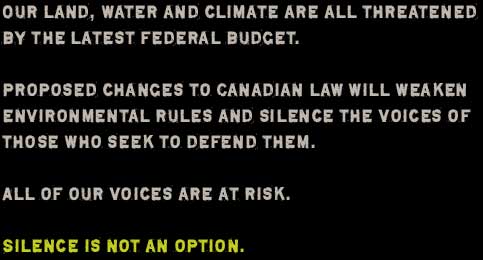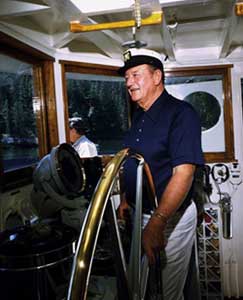There’s a glaring misconception in the move by Stephen Harper’s government in Thursday’s budget to speed up the review of resource projects, including the Northern Gateway Pipeline. The government wants reviews to last between 12 and 24 months and to avoid duplication between the federal and provincial governments. The buzzword is “one project, one review.”
The misconception is that natural resource reviews can go on as they have since the 1980s when the deregulation craze made any kind of resource hearing, especially those before the National Energy Board, into a private club for the oil patch, government and energy lawyers. NEB hearings are plagued by arcane rules of procedure and evidence that were, probably in an “out of mind out of sight” way, created to exclude the public. The public, despite the consultation mandates of the review agencies, didn’t really matter a damn. It is likely with the changes brought in by the Harper government, with its vocal hostility to the environmental, the public will matter even less.
A second misconception promoted by the government, by right-wing think tanks and supported by a lot of the media is that the Northern Gateway Joint Review Panel has been sort of hijacked by the green movement with sole purpose of delay, delay, delay.
The problem is that none of these people, not Finance Minister Jim Flaherty, not the Prime Minister, not the columnists, nor academics for universities or think tanks have attended many (or any) of the hearings or read the transcripts. They don’t look at the lists of intervenors, those who have said they want the opportunity for a 10 minute comment or filed letters of comments.
What has changed in just the last five years or so, just as Northern Gateway was getting underway, was the rise of social media, blogging, Facebook, Twitter, YouTube. The widespread use of social media means that despite the efforts of Stephen Harper to stifle opposition, pipeline hearings now and in the future will be governed by —let’s call it the “British Columbia Spring.” If the hearings are curtailed by the government, social media isn’t going away and those opposed to the pipeline will simply find ways to escalate their protests.
It’s not green manipulation that is delaying the hearings, it is that pipeline hearings have become “hyperlocal”* as social media makes everyone aware of what’s going on. That means that each neighbourhood, each village, each block, each wharf now know how a pipeline will affect their lives. This applies to the First Nations across the pipeline route and down the coast; anyone who drives BC’s highways and sees avalanche gates and avalanche warnings; commercial salmon, halibut and herring fishers; the ailing forestry industry. It’s not just BC, it’s a farmer in Nebraska, a rancher in Texas, a homeowner in Michigan, a shrimp fisher in Louisiana. Their worries are available on Google, Facebook, Twitter in a way that wasn’t possible just a few years ago, when stories about NEB hearings were buried in small paragraphs on the back pages of the business section of a newspaper.
Although the right-wing media loves to concentrate on a couple of people from Brazil who may or may not have signed up inadvertently, the vast majority of the 4,000 people who are scheduled to speak before the Joint Review Panel are vitally concerned about strictly local issues. Scheduled to speak is now the operative term because it is likely that the Harper government will cut off the opportunity to speak, and that will only further decrease the already shaky credibility of the Joint Review Panel with the people of British Columbia directly affected by the Northern Gateway.
One of the most perceptive academics in the energy field, economist Andrew Leach (albeit based at the University of Alberta) led a discussion on Twitter opening it with this question
Can anyone provide a single piece of evidence that longer environmental processes, beyond a certain point, yield higher quality evaluation?
Again, no evidence of this beyond a certain pt. Long process often cited as evidence of sound analysis, but two are not same.
IMO, there’s no reason that, w proper resources, you could not fully assess impacts & set appropriate conditions for major projects in 2yrs.
Context: NGP JRP decision is expected now at the end of 2013, roughly 4 years after hearing order issued, but <2 yrs after first hearings.
Leach makes two shaky assumptions.
The first assumption is that the hearings can come up with a quality evaluation and sound analysis. But a quality evaluation, sound analysis for whom? For the private club that the NEB has been for the past quarter century? Sound analysis from a government that muzzles its own scientists and cuts funding for proper research and now wants to have the Canada Revenue Agency harass its environmental opponents? As the responses by First Nations and local groups to the filings by Enbridge show, counter analysis often takes years of research and lots of money. Sound analysis if the opponents are given limited opportunity to respond to a proposal?
The second assumption is that the current and future hearings are going to be fair, independent and transparent. In his conference call yesterday with local reporters, Skeena Bulkley Valley MP Nathan Cullen said the Joint Review and future hearings are “rigged,” predicting that “people won’t stand for this” and it “will only hurt the company it’s supposed to protect.”
The panel has already heard a large number of intervenors in various communities across the northwest tell them directly that the process has no credibility. The decision by the Harper government to speed things can only increase the belief that the hearings are unfair, are rigged, that building the pipeline is a foregone conclusion.
Or quality evaluation for the people directly affected?
Testimony before the Joint Review Panel has been about hyperlocal issues, the state of an estuary, the legacy of the poisoning of a stream by now defunct paper mills, one aboriginal family’s traditional trapline, the shellfish beds polluted by the Queen of the North sinking, the danger to culturally modified trees, the fact that the pipeline will bring no more than a handful of jobs to British Columbia, while endangering thousands fishing and tourism jobs. You might want to call that “Not In My Back Yard” but then the Calgary water supply won’t be out of operation for four years as could happen in a worst case scenario for the Kitimat River in case of a pipeline breach along the river or its tributaries.
If the public believes that future hearings are not “quality evaluation” but rigged in favour of the energy industry, then there will be resistance there as well. What kind of resistance the decision will bring remains to be seen. But that resistance, whatever form it takes will likely also be a factor in any future resource hearings.
Then there is the question of jobs. There just aren’t going to be that many jobs in British Columbia from the Northern Gateway pipeline. First Nations communities, in the unlikely event they agreed to a pipeline, will see no long term benefit from temporary construction jobs. How many Canadian jobs will there be, if the rumours that been circulating in Kitimat for months now are true that PetroChina will build the pipeline? ( recently somewhat confirmed by the Financial Post, although also characterized by Enbridge as speculation)
Don Cayo, writing this morning in the Vancouver Sun says
But the biggest deal in the budget by far, at least as far as the West is concerned, has nothing to do with spending. It is the intention to clean up, at long last, the snarl of red tape that has become such an impediment to development in the resource sector….
it’s a spurious argument to try to link the efficiency of the regulatory process and the fairness of it. “Slow” is not a synonym for “good” nor is “faster” another word for “worse.” It does immense harm to the economy and no good to anyone at all, as history proves, to have a Byzantine process that is obscenely expensive for both the public and private sectors.
Nor is the pipeline the only project in need of fair and reasonably fast assessment. The West in general and B.C. in particular are awash in potential projects — mines, energy developments and more — and we’ll all be better off knowing sooner rather than later which ones are appropriate to move forward.
This simply shows that the advocates of the fast track process don’t get it. They are stuck in the small c conservative mantra of cutting “red tape.” There have been no recent changes in the red tape. The National Energy Board procedures, as I said, are already unfriendly to the ordinary public.
What has changed is that with the web, with social media, the people directly affected, who in the past would have been frozen out of the procedures by lack of communication, are now participating to the fullest extent possible, using information gleaned from the web and empowered by social networks. That isn’t going to change.
As much as the Conservative government believes it control the agenda, and the procedures of the resource hearings, it can’t. All it takes for a hearing to be overwhelmed is a lot of concerned residents, acting on their own, not pushed by ENGOs, prodded by a single e-mail, Tweet or Facebook post.
It may be that the energy industry, a decade from now, will regret what they wished for, a fast track process that is actually bogged down in all the kinds of court challenges that lawyers can work up, regional and municipal zoning barriers, sympathetic bureaucratic delays at the provincial level, civil disobedience, including blockades on land and sea bringing Canada a growing international media black eye, beyond the current impression of the bitumen sands as Mordor. As much as Harper may not like it, if an Oscar-winning star is arrested at a pipeline blockade it will be international news.
To use a a current analogy, with the centenary of the sinking of the Titanic approaching, the Steerage passengers are now demanding a place at the First Class table, along with the haughty oil barons, the high priced lawyers and holier than thou consultants. Stephen Harper and Jim Flaherty may close some of the gates between Steerage and First Class, but eventually the Third Class passengers will find a way to the upper decks.
(Every time someone from Enbridge at a Kitimat meeting says how safe the oil tankers and their escorts will be, one audience member always brings up the Titanic in a question and answer session)
Notes
1. *What is hyperlocal?
Hyperlocal is usually a term in online journalism, referring to coverage of a specific neighbourhood. In some ways, Northwest Coast Energy News, based in Kitimat is a hyperlocal site. That is why it is easy to recognize the hyperlocal nature of those who testify at the Joint Review Hearings. It can be as hyper hyper local as the pipeline crossing a skiing/hiking trail.
For a longer, somewhat academic definition of hyperlocal, the Wikipedia entry may be valuable.
2. Scope creep and dismissing local concerns
In a paper for the conservative C. D. Howe Institute, Leach’s colleague Joseph Doucet, Interim Dean of the University of Alberta School of Business, UnClogging the Pipes; Pipeline Reviews and Energy Policy, complains about what he calls “scope creep” in NEB hearings and says:
It is not simply not efficient or effective to attempt to solve broad, far-reaching societal challenges such as First Nations land claims or greenhouse gas emissions policy through individual project reviews.
and concludes
Regulatory review should focus on relatively narrow project definitions consistent with the impacts of the project , including its relevant costs and benefits and the scope of the activity of the proponent, Other issues, broader and more general in nature should be dealt with in statue or in policy, not in regulatory review.
There is one thing missing in Doucet’s analysis. The “scope of activity” of people directly affected by a pipeline project. What he calls “scope creep” has occurred due to the rise of public awareness due to the web and social media. In his paper, the lives of the local residents and hyperlocal issues are simply written off.
Doucet ignores that fact this government’s policy, while spinning respect for the environmental issues in single paragraphs, is to bulldoze the pipeline across BC, no matter what the consequences. On one hand, the Harper government pushes the pipeline as a gateway to Asian markets. On the other hand, with the $80 million cut to the Department of Fisheries and Oceans, with cuts to Environment Canada and support for independent environmental research, cuts to the Canadian Coast Guard, the policy is clear, the Harper government is ignoring the potential catastrophe from an oil pipeline breach or tanker disaster.
Enbridge Northern Gateway, on the other hand, does have contingency plans for such events, but at meetings in Kitimat, even Enbridge officials have expressed public scepticism about how much government support there could be in the event of a disaster. In fact, if the Harper government had more respect for the environment and actually had plans to counter a potential disaster, there likely would be less opposition to the Northern Gateway.
The only way to have any check and balance on the Harper bulldozer is to have an effective, thoroughly independent and wide ranging inquiry process, not a narrow one aimed at tweaking regulations.















